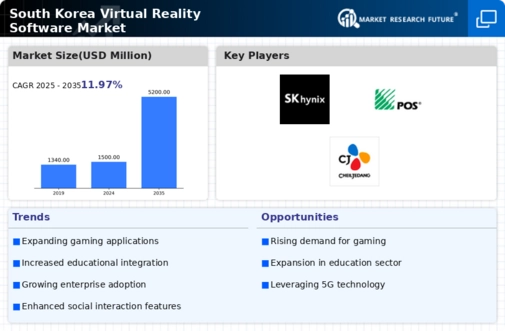South Korea Virtual Reality Software Market Summary
The South Korea Virtual Reality Software Market is poised for substantial growth, projected to reach 5200 USD Million by 2035.
Key Market Trends & Highlights
South Korea Virtual Reality Software Market Key Trends and Highlights
- The market valuation is expected to increase from 1500 USD Million in 2024 to 5200 USD Million by 2035.
- A compound annual growth rate (CAGR) of 11.97 percent is anticipated from 2025 to 2035.
- The growth trajectory indicates a robust expansion in the virtual reality software sector within South Korea.
- Growing adoption of virtual reality technology due to increasing demand for immersive experiences is a major market driver.
Market Size & Forecast
| 2024 Market Size | 1500 (USD Million) |
| 2035 Market Size | 5200 (USD Million) |
| CAGR (2025 - 2035) | 11.97% |
Major Players
Samsung Electronics (KR), SK Hynix (KR), LG Electronics (KR), Hyundai Motor Company (KR), Kia Corporation (KR), POSCO (KR), Naver Corporation (KR), Kakao Corp (KR), CJ CheilJedang (KR), Lotte Group (KR)













